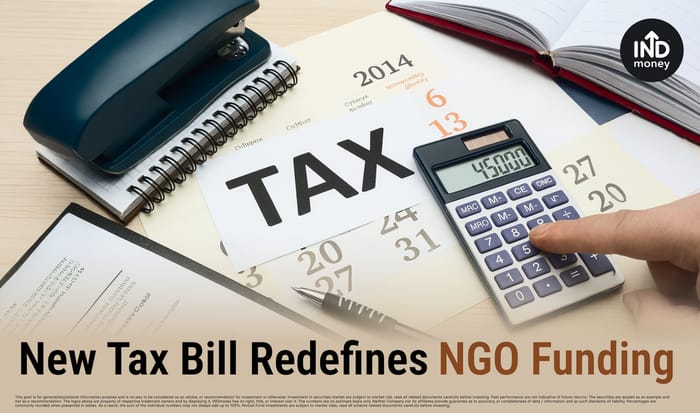
- 1. Anonymous Donations - The End of Mystery Money (Clause 337)
- 2. The 85% Rule, Spend or Pay Tax (Clause 336)
- 3. Business Activity Caps (Clauses 345–346)
- 4. Compliance Is Non-Negotiable (Clauses 347–350)
- Why This Matters Beyond NGOs
- Final Takeaway
Imagine, You run a small trust that funds a free clinic. A loyal supporter hands over a ₹2 lakh cheque, but under the new rules, you can’t take it unless you record their name and PAN. This isn’t about suspicion; it’s about compliance.
That’s the reality coming with the Income-tax Bill, 2025, passed in August and set to replace the 1961 Income-tax Act from April 1, 2026. While it covers all taxpayers, it brings some of the biggest changes in decades for NGOs, trusts, and charities.
Here’s what’s changing, and what it means for the way India gives and receives help.
1. Anonymous Donations - The End of Mystery Money (Clause 337)
Under the old system, NGOs could accept anonymous donations within certain limits. The new bill changes the game:
- Any anonymous donation above ₹1 lakh or over 5% of total anonymous donations will now be taxed.
- Only fully religious trusts (like temples, mosques, churches) are exempt. If a trust does both religious and charitable work, say, running a temple and a school — the exemption is gone.
Impact: NGOs will have to collect donor IDs like PAN or Aadhaar to keep funds tax-free. Expect online donation portals to build in verification as standard.
2. The 85% Rule, Spend or Pay Tax (Clause 336)
This rule isn’t new, but it’s now clearer and stricter.
- NGOs must use at least 85% of their income each year for approved purposes.
- If money is left unspent, wrongly invested, or used for non-approved activities, it becomes taxable.
Impact: Charities can no longer “park” funds for years without formal approvals. Planning will have to ensure most funds are used within the same tax year.
3. Business Activity Caps (Clauses 345–346)
Many NGOs raise extra income through events, merchandise, or services. Now:
- For NGOs working on “general public utility,” business income can’t exceed 20% of total receipts.
- For others, only small, related commercial activity is allowed, with separate accounts kept.
Impact: Fundraising fairs, ticketed shows, and product sales will need to stay within limits or risk losing tax benefits.
4. Compliance Is Non-Negotiable (Clauses 347–350)
If your income is above the basic exemption limit, you must:
- Maintain proper books of accounts.
- Get an audit done.
- File annual tax returns.
- Invest only in government-approved ways; other investments can be taxed.
Impact: Even small NGOs will need trained accountants or compliance experts.
Why This Matters Beyond NGOs
- For donors: Be ready to share your ID for bigger contributions.
- For corporates: CSR contributions will have to go to NGOs with strong compliance systems.
- For the sector: While these changes may build trust and transparency, they also increase paperwork and legal responsibility.
Final Takeaway
The Income-tax Bill, 2025 puts NGO funding under a brighter spotlight. Supporters of the move see it as a way to increase accountability and ensure donations are used for the right purposes. Critics worry it could burden smaller charities with compliance costs.
Either way, the message is clear: in the future, good intentions will need good paperwork to match.
Disclaimer
Investments in the securities market are subject to market risks, read all the related documents carefully before investing. The securities are quoted as an example and not as a recommendation.This is nowhere to be considered as an advice, recommendation or solicitation of offer to buy or sell or subscribe for securities. INDStocks SIP / Mini Save is a SIP feature that enables Customer(s) to save a fixed amount on a daily basis to invest in Indian Stock. INDstocks Private Limited (formerly known as INDmoney Private Limited) 616, Level 6, Suncity Success Tower, Sector 65, Gurugram, 122005, SEBI Stock Broking Registration No: INZ000305337, Trading and Clearing Member of NSE (90267, M70042) and BSE, BSE StarMF (6779), SEBI Depository Participant Reg. No. IN-DP-690-2022, Depository Participant ID: CDSL 12095500, Research Analyst Registration No. INH000018948 BSE RA Enlistment No. 6428. Refer https://indstocks.com/pricing?type=indian-stocks; https://www.indstocks.com/page/indian-stocks-sip-terms-and-condition for further details.